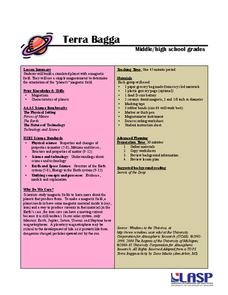Curated OER
The Solar System
For this solar system worksheet, students use a word bank of planet names to answer questions about planets. A reference website for additional resources is given.
Curated OER
Solar System
Students create and present PowerPoint presentations on certain aspects of our Solar System. The Nettrekker search engine is used for researching the information. Students can then add music and graphics to enhance their presentations.
Curated OER
Sky Watching
Students complete night-sky observations to understand how our knowledge of the sky has been enhanced by telescopes. Students complete a timeline worksheet giving the history of telescopes. Students then then make their own observations...
Curated OER
Extraterrestrials Visit Earth
Students compare the unique characteristics of Earth to other planets and then write descriptions of Earth that might attract fictional extraterrestrials to visit the planet. They design an appealing travel brochure that incorporates the...
Curated OER
Planet-Tac-Toe Review Game
Students research the nine planets in the solar system. They play a board gram like tic-tac-toe using the names of the planets. Factual info is given to help play the game.. This sounds like a fun review game.
Curated OER
Planets or Not, Here We Come!
Students, working in groups, research planets in terms of the size, temperature, number of moons, and potential for life. They use packets and worksheets as guides for their research. Students may role-play as aliens visiting their...
Curated OER
Exploring the Planets
Sixth graders explore the planets through an interactive web site. In this astronomy based lesson, 6th graders compare planets, explore comets, and discover planet facts through a variety of activities provided by the Smithsonian Museum.
Curated OER
My Shadow is following me
In this outer space worksheet, students read "My Shadow is following me" and learn about the Solar System and how shadows are created. They then complete the 2 students tasks and answer the 5 questions in the packet. The answers are on...
Curated OER
Solar System Fun Facts
Students read facts about the Solar System. In this solar system lesson plan, students read facts on the dimensions, planets, and workings of the solar system. There is a big emphasis on Saturn.
Curated OER
What's "In" There: A Study of the Inner Planets - Mercury, Venus, Earth, and Mars
First graders identify and explore the four inner planets. In this planet science instructional activity, 1st graders watch a PowerPoint about the planets. Students read the book Our Solar System and discuss the inner planets. Students...
University of Colorado
Terra Bagga
One way to identify possible volcanic activity on other planets is by testing the planet for magnetism. A science lesson begins with pupils constructing their own planet from a dead battery, magnets, paper, and tape before labeling...
University of Colorado
Terra Bagga
Earth's magnetic poles switch positions about every 200,000—300,000 years. In the activity, groups create a planet with a magnetic field. Once made, they use a magnetometer to determine the orientation of the planet's magnetic field....
NASA
Let's Investigate Mars
Take your science class on a hypothetical field trip to Mars with an engaging astronomy instructional activity. After first learning about NASA's Mars rover missions, young scientists plan their own...
Curated OER
Our Solar System
Students analyze the theories of the formation of the universe and solar system. Students analyze planetary motion and the physical laws that explain that motion: Rotation, Revolution, Apparent diurnal motions of the stars, sun, and...
Curated OER
Discovering Our Planets
Fifth graders use a website to research the planets. They complete an activity sheet and discuss their planet facts. They demonstrate revolution and rotation.
Curated OER
Planets an Introduction
Fourth graders investigate one planet, enter information into a database, and print the database sorting for each of the attributes.
Curated OER
Inner Planets
Young scholars create a booklet about the inner planets after researching the characteristics of each planet. Students research the following items for each planet: moons, size, rotation, orbit, atmosphere, an interesting fact. Their...
Space Awareness
Sun, Earth and Moon Model
The moon orbits Earth while the Earth is rotating, and the Earth revolves around the sun. This can be a tricky concept for young astronomers. Implement an activity that helps distinguish between the movements of Earth's systems around...
NASA
Space Images
As technology advances, so does our understanding of the universe around us. Thanks to the Hubble Telescope, Mars rovers, and other high-resolution cameras, there are amazing photographs of celestial bodies, planets, comets, and more...
Teach Engineering
Manned Mission to Mars
To go or to not to go — the question for a mission to Mars. This resource provides details for a possible manned mission to Mars. Details include a launch schedule, what life would be like on the surface, and how the astronauts would...
S2tem Centers SC
Seasons
Winter, spring, summer, and fall—take the learning of the seasons beyond the elementary level to the middle school classroom. Curious learners begin by watching videos about the seasons and the rotation of planet Earth. Then,...
Ventura County Air Pollution Control District
Effects of Global Warming
Your learners have probably heard of climate change, but do they really understand what it is? Study the history, details, and future implications of global warming and the greenhouse effect with a set of activities designed for an...
Curated OER
Galaxy Adventure
Working in groups, learners create a mnemonic device, give an oral presentation, and create a pictorial representation of the correct sequence of the planets and asteroid belt from the sun. An assessment rubric is included in the lesson.
Curated OER
Mars
After reading a short excerpt about the planet named after the Roman god of war, Mars, your class will answer four comprehension questions. The activity challenges them to fold over the paper and answer the questions without referring...

























